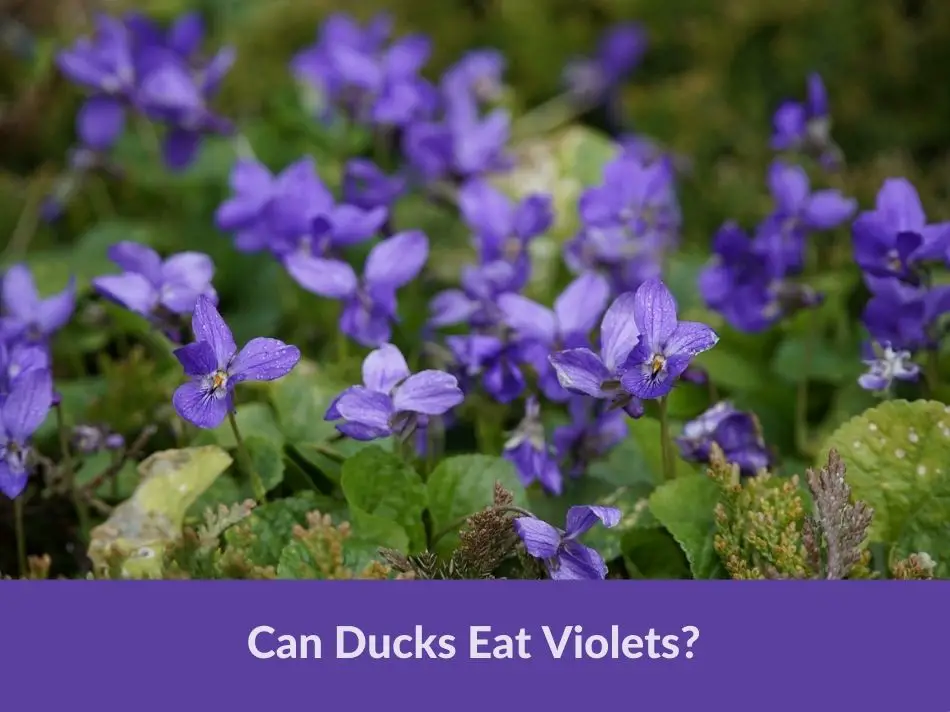Ducks are omnivorous creatures with a diet that includes aquatic plants, small fish, insects, and grains. Wild ducks often forage for seeds, worms, small mollusks, and even algae. On the other hand, domesticated ducks, such as those found in farms or homesteads, may be fed a mix of waterfowl pellets, grains, vegetables, and fruits. But, can ducks eat violets?
Yes, ducks can eat violets. Violets are non-toxic to ducks and can be a pleasant treat for them. Many wild ducks may naturally encounter and consume violets during their foraging sessions. Violets are packed with vitamins and antioxidants, which can provide additional health benefits to ducks.
In this article we will discuss the topic of ducks eating violets and the health benefits of doing so. We also cover if ducklings can eat violets and some more tasty options for ducks.
Can Ducklings Eat Violets?
Ducklings, like adult ducks, can consume violets. Yet, their dietary needs are a bit different from mature ducks. Ducklings are in a growth phase and require more protein and specific nutrients for proper development.
While violets won’t harm ducklings, they shouldn’t be a significant part of their diet. If you wish to introduce violets to ducklings, it should be in minimal amounts and not before they’re a few weeks old. Always prioritize giving ducklings the appropriate starter feed to support their growth.
Are Violets Healthy For Ducks?
Violets, like many other plants, offer a range of nutritional benefits that can be advantageous to ducks when consumed in moderation. Let’s break down the key nutritional components of violets and their implications for duck health:
- Vitamins and Antioxidants: Violets are known to be a good source of vitamin C, a powerful antioxidant. This vitamin helps to boost the immune system, aids in the repair and maintenance of tissues, and can assist in the absorption of iron from plant-based foods. Additionally, the presence of other antioxidants in violets can help combat oxidative stress in ducks, promoting overall health and well-being.
- Minerals: These plants contain essential minerals like magnesium, potassium, and calcium. Magnesium plays a role in numerous biochemical reactions in the body, including energy production. Potassium helps maintain proper muscle function, and calcium is crucial for bone health, especially important for ducks who lay eggs.
- Dietary Fiber: Violets have a decent amount of dietary fiber. While ducks don’t necessarily need as much fiber as herbivorous animals, a moderate intake can aid in digestion and help with regular bowel movements.
- Mucilage: This is a sticky substance found in violets, which can be beneficial for ducks with digestive issues. Mucilage can act as a soothing agent for the inner lining of the digestive tract, potentially alleviating mild irritations.
- Salicylic Acid: Violets contain small amounts of salicylic acid, a natural pain reliever and anti-inflammatory compound. This can be advantageous for older ducks or those with minor inflammations, offering a mild soothing effect.
- Flavonoids: These are compounds that have potential anti-inflammatory and antioxidant properties. Flavonoids in violets can contribute to the general health of ducks by helping ward off potential inflammations and infections.
More Flowers Ducks Can Eat
Ducks have quite a varied palate when it comes to their diet, and many types of flowers are both safe and nutritious for them. Flowers can provide ducks with essential vitamins, minerals, and other nutrients.
If you’re curious about more flowers are safe for ducks, here are a few you can consider:
Don’t forget to take a look at our detailed list of flowers and plants that are safe for ducks.
Conclusion
While violets possess numerous nutritional benefits, it’s essential to remember that they should not constitute a significant portion of a duck’s diet. The primary diet of ducks should be well-balanced, encompassing all their nutritional needs, from proteins and fats to vitamins and minerals.
Treating ducks to violets can be a way to supplement their diet with additional nutrients, but this should be done in moderation to maintain the health and longevity of the ducks.
Disclaimer: The information in this article is for informational purposes only. I'm not an expert or a veterinarian.


